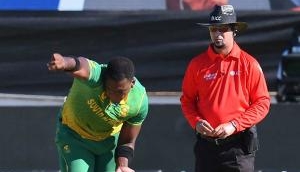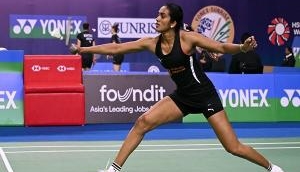Down but not out: what stops Indian sportswomen from talking period

Back in January, Britain's number one tennis player Heather Watson shocked the world with a comment she made. Nope, it wasn't about drugs of any sort, but about a monthly biological occurrence - her period.
Watson, without spelling out menstruation, said that "girl things" were the reason for her first-round defeat at the Australian Open. And awkwardly enough, it resulted in a huge debate. Because there's an unspoken rule that female sportspersons must pretend that there's no such thing as blood.
Read- World Menstrual Hygiene Day: why we must talk about menstruation in India
But things don't go away if you pretend they don't exist. That's plain ostrich mentality, and that too for what? Period. A monthly cycle that's actually a sign of good health in women.
Secret medicines
It is an occupational hazard for women in sports to overexert their bodies, to push the boundaries, and to workout in extreme conditions. Now if we were to add period to this equation, wherein they are expected to not only excel, but do so silently, uncomplainingly, without demands for breaks or facilities, it becomes downright inhuman.
And of course, these women must also secretly find the solution to this monthly 'problem'. So they turn to contraceptive pills, or worse - norethisterone, a hormonal tablet which delays menstruation. Such measures can cause more harm than good to the player's body, and it only gets worse when there's no medical assistance.
Also read: British drag artist flees India, accuses WEF organisers of threats
"Doctors in sport are often men and they don't understand," long-distance runner Paula Radcliffe said after her colleague Jessica Judd lost out at the World Championships in Moscow in 2013. The reason? A wrong prescription to avoid period.
"You need more women who understand to give more evidence, have more studies done, because it's only a small group of elite sportswomen who have tried to do things to control their period," Radcliffe told BBC.
No respite
But if British sportswomen are worried about the sort of medical aid provided at sporting events, Indian women are battling with much worse - zero aid.
Harshit Kaur Jawanda is an international squash player who made it to the Top 8 at the British Open. But before that, she lost out to a player from Mumbai at Indian Junior Open because she could barely move on her period.
Read more- Antidote: celebrating the first period can help end menstrual shame
"I couldn't move on court. It felt like I was carrying a lot of weight on my body," she says.
"I get severe stiffness, back pains and stomach pains. I try and train even harder so that I get used to it. But [period] reduces my movement on court."
And she carries regret for this. "I know I need to get used to it. And that's why I don't take days off/ Why rest during training when you can't rest during matches?"
And her male national coach doesn't make matters easier for Jawanda.
"He once said 'You're a disgrace' because I couldn't perform when down. For him, as long as I'm winning it's good."
"But it gets hard. It gets very hard. You are down and have the pressure of the country weighing down on you."
What country though? One that all sportswomen unanimously agree doesn't do much for their menstrual cycle.
"They've got vending machines abroad," says Jawanda. "They have therapists and doctors for only women. Pills, medicines, everything."
"But there's nothing like that in India."
Is it 'drama'?
Dr Anju Luthra, who was a national level player in the women's kho kho team between 1973 and 1985, believes otherwise.
"These girls make too many excuses," she says about the players she currently manages as Jesus and Mary's College DP and Sports In-charge.
"Back in my time we had far less resources and we played. We didn't complain about periods, not even to our mothers."
"Nowadays girls ask for time off and they talk about it, and sometimes I tell them to shut up."
"I played a final on the first day of my period. And I won the national."
But not all young women disagree with Luthra's school of thought.
Read: Richa Chadha said a lot about bulimia. But still hasn't said enough
National level softball player Parthvi Khurana claims she performs better 'that time of the month'.
"The girls in my team sometimes have stomach aches and run [away]. But I never needed to tell a superior or ask for a break," Khurana says.
But while she plays best on her period, she does admit that there are no provisions for menstruating women in this "male dominated sport".
She recounts an incident from a year ago when her period started right before a match in Kanpur and she had no supplies.
"I couldn't find a pad or tampon and went looking for tissues alone. I played the match with tissues," says Khurana laughingly.
She believes that the sportsperson should be "prepared" herself, as it's her responsibility alone.
"This is a very small thing to remember," she says. "And believe me, it doesn't matter in those 70 minutes. You just need to be prepared."
The problem of shame
Ragini Malhotra, who is currently a BCCI level 2 coach, DDCA convenor and founder of SM Cricket Academy, had a different concern about period back in the day when she played matches at the Rani Jhansi (equivalent to Ranji) level.
"When we were young and used to play, it was only and only in whites. And back then there were no ultra thin pads," she recounts about playing the North Zone between 1987 and 1996.
"All pads were very thick and we had to tuck our shirts in."
Malhotra and the girls in her team were more concerned about the awkwardness than the pain.
"More than the pain and the discomfort, we were all very conscious of it [the pad] showing and [the period] being obvious to all. That, plus higher risk of staining, because whites," she says.
And the problem of shame persists.
Sanjana Bhatnagar, ex Delhi Ranji cricketer had difficulties in telling her coach or superior that she needed a break due to periods.
"I was too shy to go up to them and tell them," says Bhatnagar. "It took me some time before I started saying the usual 'I have a stomach ache'."
Bhatnagar would've preferred if India were a little more open about the subject.
"They take out the best from each player [in other countries]. But not here."
"And that gives them [international players] an edge," she adds.
More in Catch:
British drag artist flees India, accuses WEF organisers of threats
Hundreds of Kailash Mansarovar pilgrims stuck in Nepal
Bhopal Gas Tragedy: this petition on White House website aims to bring Union Carbide to the book
Obama makes a speech for 'moral awakening', but won't apologise in Hiroshima
First published: 28 May 2016, 6:40 IST






![BJP's Kapil Mishra recreates Shankar Mahadevan’s ‘Breathless’ song to highlight Delhi pollution [WATCH] BJP's Kapil Mishra recreates Shankar Mahadevan’s ‘Breathless’ song to highlight Delhi pollution [WATCH]](https://images.catchnews.com/upload/2022/11/03/kapil-mishra_240884_300x172.png)

![Anupam Kher shares pictures of his toned body on 67th birthday [MUST SEE] Anupam Kher shares pictures of his toned body on 67th birthday [MUST SEE]](https://images.catchnews.com/upload/2022/03/07/Anupam_kher_231145_300x172.jpg)






